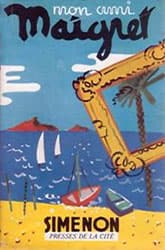My Friend Maigret
Critique • Quotes
 First edition
First editionOriginally
Mon Ami Maigret
First publication
1949
Literature form
Novel
Genres
Crime, mystery
Writing language
French
Author's country
Belgium
Length
Approx. 54,500 words
The mind games of Maigret
My Friend Maigret is often ranked among the best of Georges Simenon's Inspector Maigret crime works, if not the best. Which is curious because the novel is somewhat of an anomaly—not the usual Maigret.
Which, come to think of it, may not be so strange after all. This short novel's differences from all the other short Maigret novels may be exactly what makes it stand out for certain critics and readers. My new theory is that the differences in My Friend Maigret work to draw attention to certain features that are present in most Maigrets but are usually just not so obvious.
Simenon's seventy-five novels featuring Maigret are of a consistent quality. The mystery, which often seems the least important element of any Simenon story, is usually appropriately puzzling but is seldom concluded with an ingeniously contrived solution as in most Golden Age mysteries. The mechanics of the murders are less interesting than the lifestyles and motivations of the people involved in each case. Maigrets—and we the readers—become more involved in why whodunit did it.
The characterizations and ambience are consistently delivered, as are Maigret's moods. It's hard to say they are significantly better drawn in any particular book in the series.
So what's different with this one? It may be thought the title gives a clue, but we can discard this idea quickly. The words "my friend Maigret" ("mon ami Maigret" in the original French) does not make this a faux memoir of sorts. It's just a public boast by a petty criminal before he is found dead.
Recurring self-doubts
The setting is not the inspector's usual Parisian stomping grounds but an island off France's Mediterranean coast inhabited mainly by fishermen. Having Maigret away from his familiar milieu and colleagues is not unique in these books. And as much as we all enjoy his relationship with Madame Maigret, this is not the first time she is practically ignored in a story.
Nor is it the first time Maigret comes to doubt his own abilities. Truth be told, the title character is drawn somewhat erratically (or, to be kind, you could say he is nuanced). At times he's the Paris sophisticate, other times he's the two-fisted common man. He's sensitive, he's bullheaded. He's straightforward, he's devious. He's lazy, he's a workaholic. He's morally above reproach, he takes the law into his own hands. I suspect his changing personality from story to story reflects the author's own mercurial moods.
What does make a big difference in the plot here though is that a detective from Scotland Yard is assigned to shadow Maigret to supposedly learn his methods. This makes the Maigret character self-conscious, leading him to futz around soaking up the the foreign atmosphere and getting into the minds of the locals even more than usual before getting down to the particulars of the case. He's continually aware of being watched by the Englishman, he feels he's continually being judged by the man, and has a rivalry with him running through his thoughts.
For the reader this serves as a bit of a distancing mechanism. We can't help but pay more attention to Maigret's actions (and inactions), as seen by an outsider. We can't help wondering ourselves: what the heck are Maigret's methods?
Near the end Maigret tells the man from Scotland Yard that he must have learned French detectives have no methods. But we are painfully aware Maigret does have a method, which is based on studying the psychology of people in the case, even playing mind games with them. It's not exactly a method that will replace forensic analysis and detailed gathering of evidence in real police work, but it is eminently suitable for an engaging work of fiction.
In other words, we are rewarded, as always when reading Simenon, with an engaging novel of modern manners, rather than with the clever puzzles of Agatha Christie and company. In My Friend Maigret, we are more conscious of this than usual, which may trick us into thinking it must be a more outstanding literary work than the other Maigret books. In most Maigrets this quality is better hidden and is imbibed without being pointed out.
Perhaps a mind game Simenon is playing with us.
— Eric
Critique • Quotes

